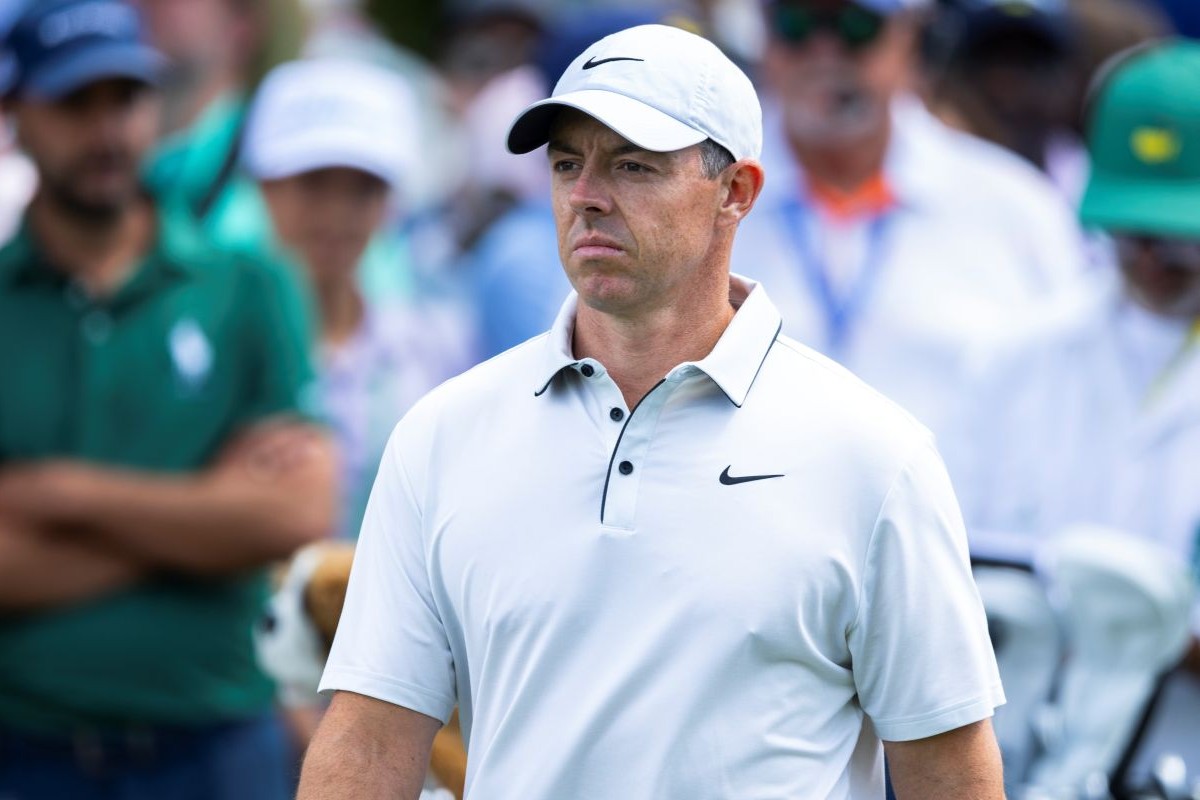“It happens in all walks of life. At a certain point in someone’s life, someone doesn’t want to fall in love because they don’t want to get their heart broken. People, I think, instinctually as human beings we hold back sometimes because of the fear of getting hurt, whether that’s a conscious decision or subconscious decision, and I think I was doing that on the golf course a little bit for a few years.
“But I think once you go through that, once you go through those heartbreaks, as I call them, or disappointments, you get to a place where you remember how it feels and you wake up the next day and you’re like, yeah, life goes on, it’s not as bad as I thought it was going to be.”
On Tuesday morning, towards the end of a 21-minute press conference, Rory McIlroy spoke the words above.
Since then, it’s been a rollercoaster ride. From the joy of watching daughter Poppy, whom he’s admitted is only coming to the realisation that he’s famous, hole a 40-footer down the severely-pitched ninth green on the par-3 course, to the agony of walking off the closing hole on the championship course knowing he’d just blown one of the finest opening rounds he’d been constructing since 2011, and that only covered the first 24 hours of tournament play.
Now, with 18 holes standing between him and golfing immortality, he’s right where he wants to be. Once again, he’s opened his heart to Augusta National and while many questions remain, only one truly matters. Will it respond with love? Or is his heart going to be broken once more?
“I know I will get plenty more chances,” he said after the final round in 2011, when he’d looked poised to become the youngest Masters champion since Tiger Woods and second-youngest of all time, but 13 of those chances have come and gone, and not once has he been back in the position he is now; on top of the leaderboard knowing that if he even gets within one of the low round of the day, no one can catch him.
To say it’s his best chance of joining Gene Sarazen, Ben Hogan, Gary Player, Jack Nicklaus and Tiger Woods as the only players to have won each of golf’s most-prized assets would be an understatement. It’s by far his best, and could well be his last, because – a playoff and extension aside – when he walks off that 18th green on Sunday evening, it’ll either be the best day of his career or the worst. There’s nothing in between.
‘Redemption’ is a word that’s often thrown out casually by sports writers, but after a major drought that’s lasted a full decade, that’s genuinely what’s on the line and in a script worthy of Hollywood itself, it’s Bryson DeChambeau who’ll be alongside him when he climbs onto the first tee and hears Toby Wilt announce the iconic words: “Fore please, Rory McIlroy now driving.”
DeChambeau, of course, was the man who provided the most cruel chapter in Rory’s tale of heartbreak at last year’s US Open, and he’s the one man – maybe Fred Couples or Bernhard Langer aside – capable of conjuring up support from the patrons that’ll even come close to rivaling that which McIlroy’s Green Jacket quest has garnered.
It’s not quite a two-horse race; Corey Conners, at four back, could produce the kind of start that McIlroy himself did on Saturday or that which Charl Schwartzel did in 2011 (birdie, par, eagle), and if he adds the Schwartzel finish (four consecutive birdies) then there’s every chance that he steals the limelight, and stutters from the final pairing open the door to something similar from Ludvig Äberg, Patrick Reed, Shane Lowry, Jason Day, Scottie Scheffler and Justin Rose, but it’s long odds against.
When Rory holed out for eagle on 15 and then set up a reasonable birdie chance on 16, just as DeChambeau’s own birdie attempt was falling low and left on 15, the gap could’ve been stretched to five, but Bryson has shown he’s not a man afraid of the big occasion and his finish showed it.
The contrast between how the two walked towards the scoring area after finishing their rounds was stark. Rory, with three straight pars after three decent birdie looks, wasn’t allowing himself to show any emotion other than polite recognition of the cheering patrons. 12 minutes later, Bryson, after birdieing two of the final three including sinking a 45-foot bomb on 18, was high-fiving anybody able to get near the rope line and shouting “Let’s go, baby!” It’s because he’s allowed to live in the moment. Either way, the final round duel won’t define Bryson’s career – not for a long time at least – but it will define Rory’s.
Being a Masters winner is more than just having a major title to your name. It’s a ticket to paradise, to coming back in 2026 and hosting the Champions Dinner and having at least a seat at the table each subsequent year. It’s being able to finally say goodbye to Masters Tournament play on your own terms as Bernhard Langer did this year, as the likes of Arnold Palmer, Jack Nicklaus and Nick Faldo have in the past.
It’s continuing to tee it up in the par-3 contest when white-suited kids have been replaced with white-suited grandkids, it’s having your own personal space in the Champions Locker Room, and it’s much, much more besides.
Later today, McIlroy faces a date with destiny. It’s in his hands, which is just the way he wants it, but can he go out and get it?
Tears are virtually guaranteed, but will they be tears of joy or tears of despair? Love, or heartbreak? Immortality, or another year closer to death?
It’s a heavy weight to bear, but it’s the only way to get what he covets most.
More than a decade’s longing meets the promise of a single day. He’ll play for the boy who dreamed here in 2011 and for every subsequent moment that’s shaped him. Whether he lifts the trophy or not, this Sunday will be a chapter, not the whole story, but in all likelihood this Sunday determines whether it’s a tragedy or a comedy.
The time is now – Rory’s ready to write it.























Leave a comment